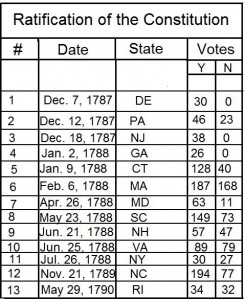Essential Questions:
-When is revolutionary change justified?
-What does it mean to have a representative government and live in a democratic society?-Why were states afraid of centralized authority and a strong central government post-American Revolution?
-What does every strong government need?
Themes: Federalist, Anti-Federalist, Balance of Powers, Federalism, Separation of Powers, Thomas Jefferson and John Adams.
1. The Constitution and Federalism.


2. Slavery in the U.S. Constitution - yah or nah?
***More on Slavery in the U.S. Constitution - please download and use the class worksheet to organize your ideas and answer the questions. "Why did the founding fathers keep slavery in the Constitution?"
3. Creating the New Constitution:
-Outline Notes - Review and let me know if you have any question.
-Easy-to-Follow US Constitution Guide
-The United State Government - Download this slideshow
1. Yes, check Google Classroom.
___________________________________________________
U.S. HISTORY II - Period 3:
Essential Questions:
-Should the United States fight wars to make the world safe for democracy?
-How did a war fought to 'save the world for democracy' end up threatening civil rights in America?
-What happens when individuals’ civil liberties are breached?
-How did World War I change America?
-Was the decade of the 1920's a time of innovation or conservationism?
-Should the USA limit immigration?
-Was the treaty of Versailles a fair and settlement for lasting world peace?
Themes: American Exceptionalism, Isolationism, Interventionism, Causes of World War I
1. A quick recap of the Essential Questions:
Group A - "Selling the War" - Was it just for the American government to "sell the war" to the American people? How supportive were Americans of selling the war?
Group B - "Attacks on Civil Liberties Increase" - How did a war fought to 'save the world for democracy' end up threatening civil rights in America? What happens when individuals' civil liberties are breached?
2. Total War on the Homefront and The End of WWI - How did American influence the war front? How did The Great War end in 1918? What were the impacts of WWI?
3. Tell me who, what, where, and why? + pages 598-600 in your Textbook

3. Read and review the website on the link on Influenza: What impact did it have on Americans? Please watch the movie below to help you understand its impact.
5. Please review the resources below and answer the question: "Why didn't the Treaty of Versailles lay the foundation for a lasting peace in the world?"
Treaty of Versailles Political Cartoon Activity - Please Complete this in Class.
Treaty of Versailles Slideshow - Please download and review!
Woodrow Wilson Presidential Video - Please watch in class OR for homework.
Homework:
1. Yes, check Google Classroom.
_____________________________________________________
International Studies - Period 4
Essential Questions:
1. How do we think about POWER in the 21st Century?
2. How do we define our interest as a country?
3. What does "hard power" and "soft power" capability and how does it impact foreign policy?
4. How is power distributed?
Themes: War vs. Peace, Sustainable Change, Hard Power, Soft Power, Smart Power
1. Victor will be presenting his current event on Venezuela. Please see the Current Events format and Current Event Rubric review it CAREFULLY, as both should guide your lesson on Current Events.
2. What is Power? What events did you find online that represents Power Events of today?
"Ultimately, the only power to which man should aspire is that which he exercise over himself." Elie Wiesel, prisoner at Buchenwald.
"Simply put, power is the ability to effect the outcomes you want, and if necessary, to change the behavior of others to make this happen.
Joseph S. Nye Jr., 2002
3. Students will have a jigsaw activity where one member of the group becomes the "Captain" and the Captain will travel to other groups to explain their findings and then the remaining group members teach the "Captain" about their own topic on:
I. Student 1: Please read the Research Institute for European and American Studies (RIEAS) article "Being Hard on Soft Power" and answer the following questions:
A. Compare and contrast how this article views soft power and hard power? Which is it more critical of and why?
B. Summarize this articles' viewpoints on the United States Army in Iraq?
II. Student 2: Please read Hillary Clinton's perspective on Power
A. What is America's Role in the World?
B. What is critical for America, Europe and the World in the 21st Century?
C. Summarize this articles' viewpoints on global power, which countries are emerging?
III. Student 3: Please read Harvard Kennedy School and Joseph Nye article "Lesson's Learned Since 9/11: Narratives Matter"
A. How should we challenge terrorism according to Joseph Nye?
B. How did 9/11 change America's foreign policy approach?
4. Video on Joseph Nye: A TED Talk with Joseph Nye, July 2010

5. Hard Power and Soft Power Readings and Resources:
- Strategic Studies Institute article "Hard Power and Soft Power: The utility of Military Force..."
- The American Academy of Political and Social Sciences article "Hard Power, Soft Power, and Smart Power"
- Robert Cooper's "Hard Power, Soft Power and the Goals of Diplomacy" (We will use this one in class!)
- Research Institute for European and American Studies (RIEAS) "Being Hard on Soft Power"
- An insightful College Paper written by Tim Quirk that gives good perspective on Hard Power vs. Soft Power.
- Soft Power and China in the 21st Century
- Hillary Clinton and the Art of Smart Power
- Harvard Kennedy School and Joseph Nye article "Lesson's Learned Since 9/11: Narratives Matter"
1. Yes, check Google Classroom.
No comments:
Post a Comment